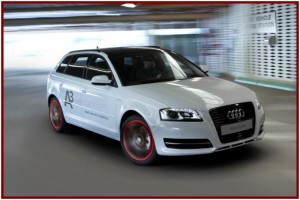
Unlike Volkswagen, which has any number of small cars it can use for CAFE credits or EV conversions, Audi has limited options to comply with increasing stringent standards.
Audi has announced that battery-electric version of the Audi A3 will be tested this year in a pilot program that will take place in the San Francisco, Los Angeles, Washington D.C., and Denver markets. The 17 cars will be driven by Audi engineers and technicians for the next 18 months or so that results can be fed back to Germany, where a freshening of the A3 is in process. The only EV that Audi has confirmed so far is an extremely limited edition of its flagship +$125,000 R-8 car, some of which will appear in the U.S. early next year.
The A3 is currently sold to U.S. consumers in gasoline-powered and turbo diesel configurations starting at $28,000 with several thousand dollars in options. The A3 EV – dubbed e-tron – has a 26kWh lithium-ion battery pack and claimed zero driving emissions, if you ignore how the electricity to charge the expensive battery pack is generated. No pricing was given since this is a development not a marketing program. One Audi insider said that eventually an A3 e-tron is “highly likely” here.
Audi claims a battery range of approximately 90 miles and a top speed of 90 mph from the 199 lb-ft torque the motor generates, which is about the same output as the turbo gasoline or diesel engines. The battery back will add weight, which means e-tron will be noticeably slower than its less expensive siblings, a marketing and engineering challenge for the German company that sells performance.
“As part of the long-range Audi corporate goal of moving toward CO2-neutral mobility, there will be e-tron plug-in vehicle products exhibiting all of the performance and design attributes Audi drivers have come to expect,” said Johan de Nysschen, President, Audi of America.
Unlike Volkswagen, which has any number of small cars it can use for CAFE credits or EV conversion, Audi has limited options to comply with increasing stringent standards. Moreover, arch rival BMW has Mini to help, and is well underway with its own EV programs.

